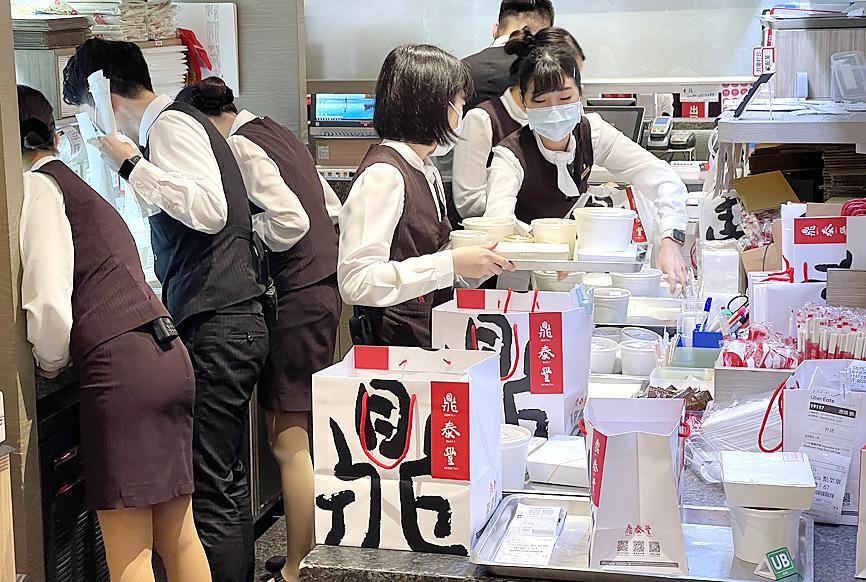Sales generated by the food and beverage industry last month totaled NT$61.9 billion (US$2.07 billion), up 61.7 percent from a year earlier and the second consecutive month of year-on-year growth, the Ministry of Economic Affairs said on Monday.
Huang Wei-jie (黃偉傑), deputy director of the ministry’s Department of Statistics, said that the significant growth was partly the result of a relatively low comparison base in June last year, when on-site dining was not allowed due to a level 3 COVID-19 alert.
Many food and beverage vendors last month intensified efforts to launch promotional campaigns to boost sales, while a gradual decline in domestic COVID-19 cases and an increase in the number of people vaccinated against the disease meant more consumers were willing to dine out, Huang said.

Photo: CNA
Last month, revenue posted by restaurants in Taiwan rose 61.7 percent from a year earlier to NT$51.1 billion, sales generated by beverage shops grew 66.6 percent to NT$8.5 billion, while revenue from catering businesses increased 46.9 percent to NT$2.4 billion, the ministry said.
In the first six months of this year, food and beverage industry sales totaled NT$399 billion, up 10.4 percent from the same period last year, with revenue generated by restaurants, which accounted for about 83.5 percent of the total, hitting NT$333.3 billion, up 9.6 percent from a year earlier, the ministry said.
The growth in sales momentum is expected to continue this month, with sales in the food and beverage industry forecast to be between NT$63.2 billion and NT$64.4 billion, up 48.5 to 51.5 percent from a year earlier, Huang said.
Huang said he remained upbeat about domestic demand in the second half of this year, although rising inflation might curb consumer spending.
Last month, retail sales rose 22.5 percent from a year earlier to NT$326.5 billion, a record for the month, ministry data showed.
In addition to a low comparison base last year, the growth was evidence that more consumers were willing to spend, Huang said.
Sales posted by department stores, convenience stores and hypermarkets rose 173.8 percent, 11.4 percent, and 6 percent respectively from a year earlier to NT$24.2 billion, NT$31.5 billion and NT$19.8 billion last month, the data showed.
Bucking the upturn, revenue generated by supermarkets fell 11.1 percent annually to NT$21.2 billion due to a high comparison base in the same month last year, the ministry said.
Online retailers’ sales totaled NT$33.7 billion last month, up 4 percent from a year earlier, the ministry said.
In the first half of this year, retail sales rose 6.7 percent annually to about NT$2.04 trillion, it said.
Retail sales for this month are expected to range between NT$338.2 billion and NT$347.3 billion, up 11.3 to 14.3 percent from a year earlier, the ministry said.

Sweeping policy changes under US Secretary of Health and Human Services Robert F. Kennedy Jr are having a chilling effect on vaccine makers as anti-vaccine rhetoric has turned into concrete changes in inoculation schedules and recommendations, investors and executives said. The administration of US President Donald Trump has in the past year upended vaccine recommendations, with the country last month ending its longstanding guidance that all children receive inoculations against flu, hepatitis A and other diseases. The unprecedented changes have led to diminished vaccine usage, hurt the investment case for some biotechs, and created a drag that would likely dent revenues and

Global semiconductor stocks advanced yesterday, as comments by Nvidia Corp chief executive officer Jensen Huang (黃仁勳) at Davos, Switzerland, helped reinforce investor enthusiasm for artificial intelligence (AI). Samsung Electronics Co gained as much as 5 percent to an all-time high, helping drive South Korea’s benchmark KOSPI above 5,000 for the first time. That came after the Philadelphia Semiconductor Index rose more than 3 percent to a fresh record on Wednesday, with a boost from Nvidia. The gains came amid broad risk-on trade after US President Donald Trump withdrew his threat of tariffs on some European nations over backing for Greenland. Huang further

Macronix International Co (旺宏), the world’s biggest NOR flash memory supplier, yesterday said it would spend NT$22 billion (US$699.1 million) on capacity expansion this year to increase its production of mid-to-low-density memory chips as the world’s major memorychip suppliers are phasing out the market. The company said its planned capital expenditures are about 11 times higher than the NT$1.8 billion it spent on new facilities and equipment last year. A majority of this year’s outlay would be allocated to step up capacity of multi-level cell (MLC) NAND flash memory chips, which are used in embedded multimedia cards (eMMC), a managed

CULPRITS: Factors that affected the slip included falling global crude oil prices, wait-and-see consumer attitudes due to US tariffs and a different Lunar New Year holiday schedule Taiwan’s retail sales ended a nine-year growth streak last year, slipping 0.2 percent from a year earlier as uncertainty over US tariff policies affected demand for durable goods, data released on Friday by the Ministry of Economic Affairs showed. Last year’s retail sales totaled NT$4.84 trillion (US$153.27 billion), down about NT$9.5 billion, or 0.2 percent, from 2024. Despite the decline, the figure was still the second-highest annual sales total on record. Ministry statistics department deputy head Chen Yu-fang (陳玉芳) said sales of cars, motorcycles and related products, which accounted for 17.4 percent of total retail rales last year, fell NT$68.1 billion, or